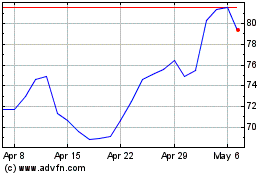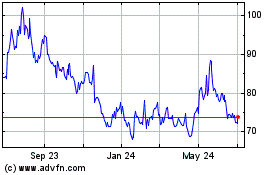Two Chinese Tech Firms Prepare Hong Kong Listings as U.S. Pressure Rises
May 27 2020 - 9:20AM
Dow Jones News
By Joanne Chiu
Two of China's most valuable U.S.-listed companies are pushing
ahead with multibillion-dollar share sales in Hong Kong, amid
growing pressure from U.S. lawmakers on Chinese companies to
disclose their financial information or delist.
The listing plans of NetEase Inc., an online games company, and
JD.com Inc., the operator of an e-commerce website, will be
reviewed on Thursday by the listing committee of the Hong Kong
Stock Exchange, people familiar with the situation told the Wall
Street Journal.
If it secures the listing approval, NetEase will begin taking
orders from investors early next week, aiming to raise between $2
and $3 billion from the secondary listing ahead of a trading debut
on June 11, a person familiar with the situation said.
JD.com plans to raise around $2.5 billion to $3 billion and
start trading in Hong Kong on June 18, the date of its annual sales
event, another person familiar with the situation said. It will
kick off the stock sale in Hong Kong in the week of June 8.
Both fundraisings have been increased in size, compared to
earlier plans, as the two companies' U.S.-traded securities have
risen this year. The final sizes will depend on market conditions
and the prices of their American depositary receipts as the
secondary listing nears, the people said.
Bigger peer Alibaba Group Holding Ltd. raised roughly $13
billion through a stock sale in the city last November.
NetEase joined the Nasdaq in 2010. Its American depositary
receipts have risen nearly 26% this year, giving it a market
capitalization of nearly $50 billion as of Wednesday. The
equivalent securities for JD.com, which went public in the U.S. in
2014, have risen 49% this year, giving it a market value of around
$77 billion.
The listings come at a sensitive time for Chinese companies --
and for Hong Kong.
Rising U.S.-China tensions and recent admissions of accounting
fraud at Luckin Coffee, a Chinese cafe chain that only went public
last year, have prompted heightened scrutiny of U.S.-listed Chinese
companies.
Legislation passed by the Senate -- and now introduced in the
House -- would kick Chinese companies off U.S. stock exchanges
unless their audits are inspected by U.S. regulators.
Meanwhile, Beijing's move to impose new national-security laws
on Hong Kong has raised concerns over the city's status as a major
financial hub.
Hong Kong's stock exchange has changed its rules to court more
listings by tech and biotechnology groups, aiming to rejuvenate a
market dominated by less dynamic sectors such as banking and
property.
Robin Li, founder of Chinese search-engine operator Baidu Inc.,
this month told the state-backed China Daily newspaper the company
paid close attention to heightened scrutiny of Chinese companies
and was constantly exploring options including a secondary listing
in Hong Kong or elsewhere.
Write to Joanne Chiu at joanne.chiu@wsj.com
(END) Dow Jones Newswires
May 27, 2020 09:05 ET (13:05 GMT)
Copyright (c) 2020 Dow Jones & Company, Inc.
Alibaba (NYSE:BABA)
Historical Stock Chart
From Mar 2024 to Apr 2024

Alibaba (NYSE:BABA)
Historical Stock Chart
From Apr 2023 to Apr 2024
